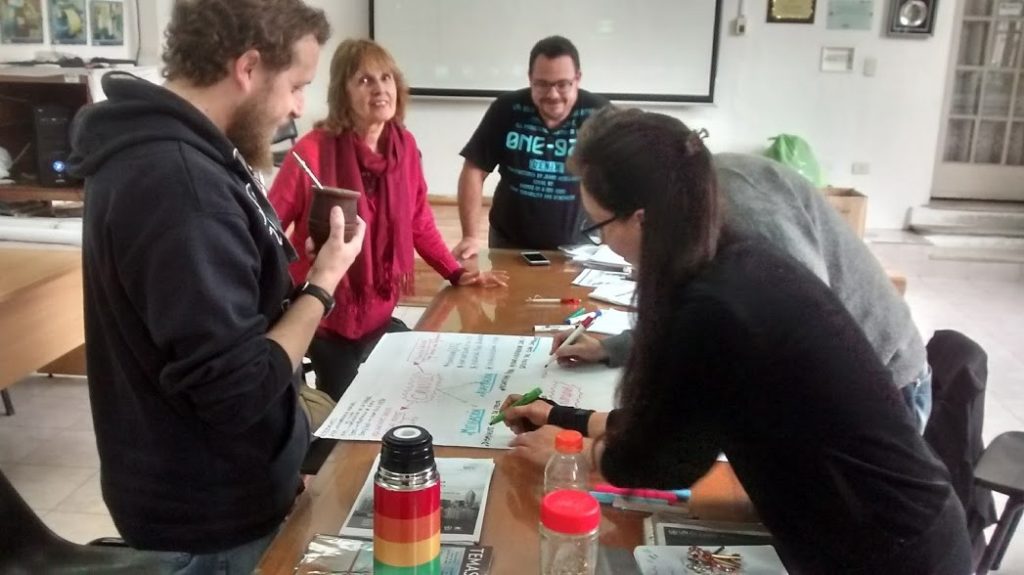The countries of the Southern Cone are no exception to the greater frequency and intensity of extreme events due to climate change. According to the National Meteorological Service, 2017 was the warmest recorded year in the history of Argentina, both in the summer and winter, with an average annual temperature of 16.66°C. In addition to the progressive rise in temperature, variations in precipitation have resulted in more intense rains and longer periods of drought throughout the country.

Poster of the workshop, disseminated through the channels of CEVA, FECOOTRA, CECOOP, the Secretary of Extension of the Faculty of Natural Sciences and the Museum of the UNLP.
For the first time, the Center for Education and Cooperative Training (CECOOP) of the Federation of Cooperatives of Labor of the Argentine Republic (FECOOTRA), together with the José María Arizmendiarrieta Study Center, held a workshop focused on climate change. Following UN CC:Learn’s premise of “leaving no one behind” in its goal of disseminating knowledge on climate change, CECOOP organized the workshop so that any interested person could attend, without any registration costs for participants.
According to Guillermo Villate, the workshop was carried out within the framework of the principles of commitment to the community and to the environment, from which the CECOOP proposes to raise awareness at the community level, with regard to taking care of the environment.

Introduction to Climate Change Adaptation of the UN CC:e-Learn course. Photo: UN Environment
CECOOP based the training on the material of the UN CC:Learn Introductory e-Course on Climate Change, which provides the foundations of climate change, covering topics from climate science to governance. Over the past three years, thousands of people around the world have learned about climate change and its threats through this online course. In terms of education on climate change, this is the United Nations initiative with greatest reach, since it is a free course and is currently available in five languages.
The workshop motivated the exchange of ideas and experiences, generating debates and making the learning experience more enriching on what to do to face climate change and the activities that produce CO2. In addition to the content of the UN CC:Learn course, complementary activities were carried out with access to other documentary materials, videos and a closing Interdisciplinary Lecture on Climate Change with researchers from the Faculty of Natural Sciences and the National University of La Plata Museum.

Activity among the participants during one of the workshop sessions. Photo: CECOOP
The delivery of the workshop was approached from the perspective of the city of La Plata, where the case of mitigation to climate change was exposed particularly in Argentina, through the experiences of the cooperative “Creando Conciencia”. The mission of this Cooperative is to take care of the environment through the differentiated collection of waste with final disposal of each of them according to their characteristics. It also classifies, conditions and reinserts recyclable waste.
Among the participants of the workshop was a victim of the floods that occurred in 2013. Since then, Francisca Pinto has set out to register indicators, which she seeks to transfer to a digital format in the future, so that these serve as a source of information to benefit society in the legislative, administrative and training fields.

Participants during one of the workshop sessions. Photo: CECOOP
I could understand an issue that is not how it should be discussed within society and at the political level. I thought it was an interesting initiative that would be good to replicate in other places to continue to reach more people to generate collective awareness and allows to put on the world’s agenda the solution to the challenge of climate change.“ – Manuel María De Arrieta, participant of the workshop on climate change.
Upon the positive experience and good reception of the workshop, CECOOP intends to continue replicating the course in different regions of the country and include other fields of study among them, for example, how to prepare cities for the context of climate change through infrastructure. They also intend to continue raising awareness among communities about climate change and generate a collective interest in this important issue that threatens the entire world.

